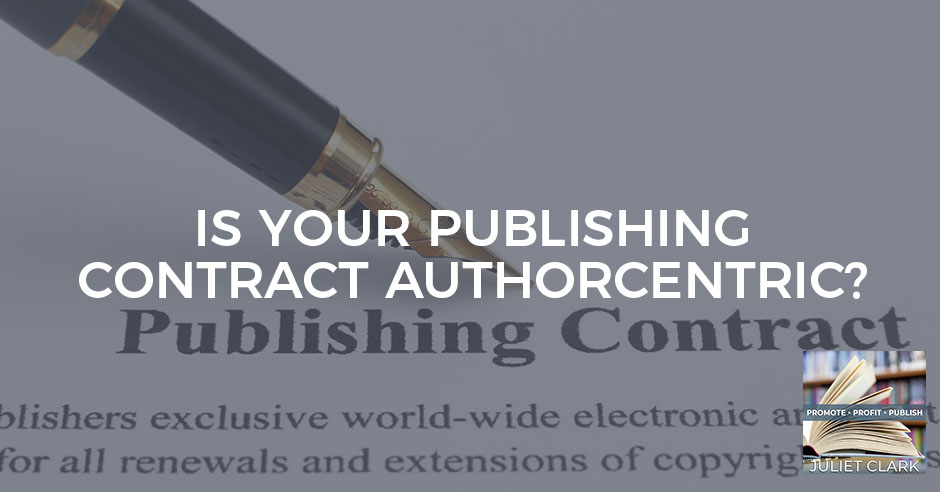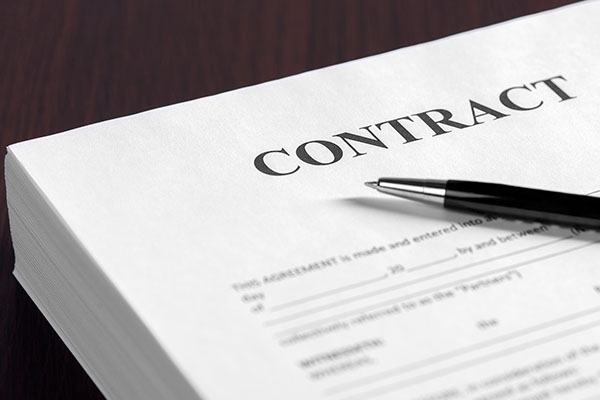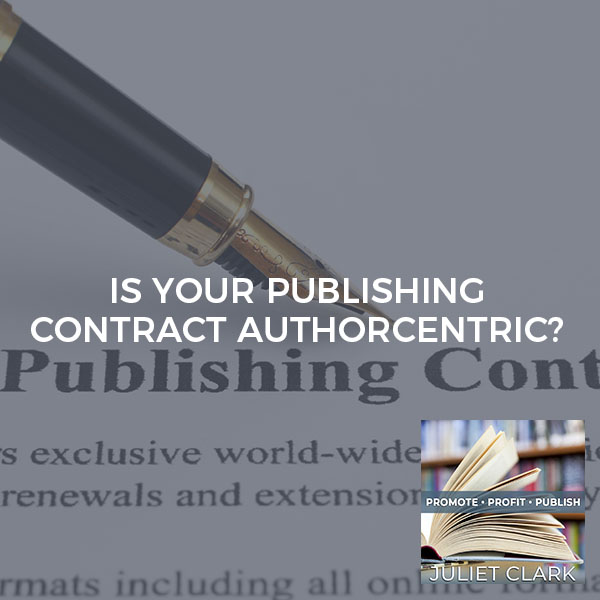
A publishing contract is a legal contract between a publisher and a writer where the former is allowed to published the original content of the latter. This may involve a single written work, or a series of works. Although publishing contracts protects both the publisher and the writer, it does not make things favorable for the writer itself. On today’s episode, host Juliet Clark talks about authorcentric publishing contract to help writers and authors get informed on what they need to consider. Don’t miss out on this episode!
—
Watch the episode here
Listen to the podcast here
Is Your Publishing Contract Authorcentric?
I have a very important topic I want to talk to you about. I’m super excited. Before we get going, remember to go over to Breakthrough Author Magazine and get your free copy. You can find that at www.BreakthroughAuthorMagazine.com. If you’re somebody who likes videos, go over and subscribe to us on YouTube. You can find that at Superbrand Publishing. We’ve got a lot of trainings coming up that are going to be over there as well. It might be an actual bonus for you to go over and take a look around on YouTube.
We’re going to talk about something that came up at Media Magic, an event that I was the keynote at with Shannon Procise. One of the things that we talked about, not in great depth but I want to get into a little more depth here, were the contracts that we’re seeing out there. If you’re uncomfortable with a contract that a publisher gives you before you sign it, we welcome you to have an attorney look over it.
We’re happy to look over it as well and tell you where the money traps are in there, and if this is an author-centric contract. A lot of what we’re seeing is that when you’re self-publishing, the contract should be all about you. The services that those people or that company that you’ve chosen are providing shouldn’t be about how they’re going to profit on the backend. Let’s jump right in here with this.
Never Give Up Your Rights
I’m going to go over the five basics. I’m also going to give you some sample contracts we’ve seen lately and what you’re looking for. The first thing to know, number one, is to never ever give up your rights on a self-published product, especially if you’re an entrepreneur. That intellectual property is yours. If you’re using that book as a tool for your products and services, it’s important that that intellectual property belongs to you. That means that copyright needs to be filed in your name and that the contract says that you own full 100% rights and that you can do with those rights what you wish.
We saw a contract that we were a little bit shocked by. Somebody who did a bestseller campaign with us had a huge Asian audience. When she went back and inquired about why this wasn’t reaching her Asian audience who was telling her that they purchased more on Google+, she brought us the contract because she didn’t like the answer she got. We looked over the contract and a self-publishing company had taken the rights to her book. That should have never ever happened.
Understand exactly what you are purchasing and how it's going to be delivered. Share on XFurther on that as she went back and started asking questions, she found out that she was with an Amazon white label. What that meant was she was only published on Amazon. Amazon didn’t cover the market in Malaysia that she was big in. They told her that she had a one-year exclusive with them. She could only be on Amazon.
If you know anything about Amazon, they were doing that because they were giving her book away for free through the free KDP programs and coming back and saying, “We consistently get you to number one at least once a quarter.” That’s great except you don’t get paid for those books. It was a mess. She had to go back and ask for those rights back, and after much back and forth, she finally did get them back. Here was the key thing that they said in that conversation. They said, “If you sell 50,000 books then we can get you into bookstores, airports, and bigger programs.” The problem I saw with that was that if you can sell 50,000 books on your own, you don’t need somebody to do that for you. That’s number one.
Never Allow Restrictions On Those Rights
Number two is to never allow restrictions on those rights. You’re probably like, “You just said to not allow them to have your rights.” We’ve seen contracts from bigger companies that say that you own the rights but you can’t move that book for five years. That’s pretty key because you own your rights but you’re giving them the rights to that book to have that book published under them for five years. There’s no reason you would want to do that.
In this particular company, if you wanted an audiobook, you wouldn’t want to go through them. They’re very expensive compared to the other companies out there. You want to be able to take that book someplace else to have it published. Here’s the other thing we saw in the contract. We saw somebody charged for an Audible upload.
How that contract works is she paid $600 for her to go out and have that audiobook produced, and then she was supposed to bring it back and they would upload it. Let me translate what that looks like for you. For most companies who create and produce audiobooks, part of their service is to upload those books. We love Twin Flame Studios because they’re like us. They don’t take any of the profits from the author. We recommend people to go there. What this contract was asking for is that you go hire someone and then bring them back to upload.

Authorcentric Contracts: When you’re self-publishing, the contract should be all about you. The services that the company you’ve chosen are providing shouldn’t be about how they’re going to profit on the backend.
What are the ramifications of that? The contract had royalties based at 65% of the net. They were asking you to go get your book produced and bring it back to them so they could make royalties on your book. It’s completely insane. Those are the kinds of things you need to look at. As part of this and I’m not even going to make this number three. There should be no part of a self-publishing contract where the publisher gets a piece of your profits. This is so simple. This is what’s wrong with the self-publishing world.
Let’s say that I go to Office Depot and I say, “Office Depot, I would like a business card design.” They say, “We can do that. It will be $75.” They designed the card and I pay $75. Let me relate that back to publishing. When you’re self-publishing, that’s the equivalent of, “We would be happy to set up your cover design. We would be happy to format the book for you and this is what it costs.” Usually, it’s merged into a bigger package. You can see the parallel there of what’s going on.
Now, in the Office Depot description, it’s designed and now I need them printed. I go ahead and have Office Depot print me 100 cards. They come back and they hand me the box and they say, “By the way, every time you hand out one of these cards, we get 35% of the business.” They take a piece of your royalties on the backend for producing your book. That’s what most companies are doing. They will call it the industry standard. They will say, “We get 50%.” Don’t go with the company that does that. The reason is you have paid them to produce, upload and publish this book. Why should they get a piece of your profits?
I probably should have made that a number in and of itself, but when you equate it back to the Office Depot example that I gave you, you would never say, “I would love to give you 35% of everything I made by handing out a business card.” It’s the same with publishing. There’s no reason. You did all the work and you paid them to do the rest of the work.
Understand Distribution
The third point is to always understand distribution. Where is my book going to be? Within our company, we have three different levels of distribution. You can do a basic program where it’s Barnes & Noble softcover, Amazon softcover, and Amazon Kindle. It’s understanding that you’re not expecting to see your book everywhere. There’s a higher level that encompasses Google+, Apple, libraries, institutional places, and all of those other distributions as well.
Never ever give up your rights, especially if you're an entrepreneur, because that intellectual property is yours. Share on XI’m going to go back to the first example. The person who we did the bestseller campaign had no idea that she was Amazon exclusive. If you had looked at her contract, there was nothing in there. When she went back to them to solve the problem with Malaysia, I said, “Have them go over to this.” I can see on their website that they have it, but they only had it for that bigger group. I said, “You should be able to purchase it. Go back and say, ‘I would like to purchase this service so that I can get a run to Malaysia.’” They wouldn’t do it.
Understand before you jump into this where distribution is, and not only where it is but what the percentages are. There’s a little bit different percentage that the distributor takes. The distributor fees usually run 55% to 65%, and that’s for Amazon’s fees, Barnes & Noble’s fees, and Apple’s fees. Understand that before you go in because people don’t, and then they’re shocked when they’re only making $1 or $2 on each book. They’re not understanding that a huge chunk of that went out to the distributors. It has nothing to do with the publisher. It’s all the distributor.
Understand What You’re Purchasing And How It’s Going To Be Delivered
Number four, understand exactly what you are purchasing and how it’s going to be delivered. We saw a contract that said, “You paid us to produce your book but you don’t own the files.” Imagine that. I come to you and I pay you to design that cover, to design and format. I pay you for the e-Book and everything, and then you say, “By the way, you own the rights but you don’t own that piece of the work that we designed for you.” There are things in the contract that you need to understand exactly what you’re purchasing.
We saw another contract where $900 for a book return policy. That is something that is purchased when your book is in bookstores. If you’re self-publishing, chances are your book is not going to be in bookstores. Understand what you’re paying for there. I will tell you about this woman. I felt very badly for her. She paid $1,500 on her contract of items that will never ever be deliverable. They were pure profit. These people or this company knew going in that these things would never ever be deliverable. Understand, go through every line item, ask questions, and find out what the right questions are about it. A lot of times, we don’t understand that publishing has its own language.
What you think you’re getting is not always what you’re getting. I equate this to if an engineer came to me with the book and said, “Will you build this bridge for me?” I would look at it and go, “Those are plans but I don’t get the math and I don’t get it.” If you don’t understand the language, you’re not going to thrive in the industry. Be sure you understand that going in.

Authorcentric Contracts: When you’re using that book as a nurture tool for your products and services, it’s important that the intellectual property belongs to you.
Royalties
Number five is understanding royalties. This is crucial because different platforms have different percentages. I’m going to give you an example here. If you publish on Kindle, it’s a 70-30 split, 70% is the split for the author and 30% is the split for Amazon. That’s their distribution fee. There is a little download fee now, which I highly object to but it’s not my call. It’s depending on how large your file is. I can’t even tell you at any given moment how large that fee is going to be. Understand that.
When you go to a self-publisher and the self-publisher says, “You get 50% of this,” they have taken 20% of your royalties for putting up your Kindle. The other 30% is going to Jeff Bezos. Understand those splits so you can say, “This is self-publishing, why are you getting a piece of it?” While we’re at it, understand the Kindle dashboard. You should not only own your author central dashboard but you should own your Kindle dashboard. We do this all the time.
You should own it because 1) That ensures that the publisher is not getting a piece of your profits. 2) You can run your ads from there and if you don’t own that dashboard, you can’t run ads for your own book. It’s something that you should own. Here’s the other thing that we see with a lot of speakers. They go out on the road. They know they will be in town for an event. Because they have control of that dashboard, they will lower the price of their book for an event. It will be, “Go over and buy this book for the next three days while I’m here and it’s $5.99 instead of $9.99.” They have complete control over everything they’re doing. What self-publishing was supposed to do is give you control.
Also understanding the percentages over if they’re using Ingram or CoreSource. Ingram softcover has a different distribution fee than CoreSource does with the eBooks. Understanding thoroughly what your cut is and what’s going to happen with this is crucial. You should understand it upfront. Don’t be afraid to ask questions. Don’t be afraid of challenging their standard answer that you’re going to get a lot which is, “This is the industry standard.” You don’t need to go with a country company that’s the industry standard. You can get great service and own your product, and also understand your royalty cut on it.
I’m not going to get deep and give you some more bullet points. Ask lots of questions about, “Will you talk to me about categories and keywords? Will you help me with that? Will you dump me into general categories where I will never be seen?” Make sure that you’re conversing with these people or these publishing companies about where are your categories.
Don't be afraid to ask questions and challenge the standard. Share on XWe have someone who moved over to a company that I won’t name but it’s big. They put him in these big categories where no one would ever find his book. His book is about diversity and equity in the financial industry as well as some African history and African religion. We did a deep dive before he even hired me and said, “These are the available categories. Did you know that you can ask Amazon to set up categories?”
We produced a letter in his first week into our project to Amazon saying, “Amazon, it looks like your diversity and equity categories are a bit light. May we suggest these.” The answer we got back was, “Yes. When you publish your book, contact us again. We will review and add these if it’s appropriate.” Understand what you’re getting into and where that book is. Can those people get you to a bestseller list with those books? We are excited about being at the forefront of adding these categories that have never been there before for diversity and equity, and African communities.
Multi-platforms
Understanding the multi-platforms. That goes back to the royalties a little bit, but understand what platforms are you going to be on. Will you be softcover on Barnes & Noble? Will you be softcover on Amazon? Where are your eBooks going to be published? Will you have eBooks? A lot of Millennials in other countries are no longer using Amazon. They’re not Amazon-friendly places.
Let me give you an example. We have two authors. One of them is big in Sweden and the other one picked up Swedish clients because her eBook was available on Storytel in Sweden. A lot of times, Swedes go to Storytel instead of Amazon because it’s Amazon EU. It’s not directly in Sweden. Understand the multi-platform experience.
Are you doing an eBook? If you have a business book, you should be on Audible because that’s the way a lot of busy business people consume their books. They will go out and purchase an Audible book. If they think it’s a reference source, then they will go buy the softcover or the hardcover to keep around the office for reference on there. Do you need that audiobook? Do you need a multi-platform experience, which might be Amazon, Barnes & Noble, and those eBooks that go into different countries as well as Apple and Google?

Authorcentric Contracts: It is highly recommended that you have an attorney look over your contract to make sure that everything’s in order.
The problem with the Malaysia contract was that most of those people there were telling our client that they were using Google Books instead of Amazon. Be aware of the demographics of your audience and where they are consuming books as well. I hope that was super helpful. I know it’s a lot to digest, but there are contractual questions that you should be asking.
I offer our services. We don’t legally advise you because I’m not an attorney, but we will tell you where the money capture is in those contracts that shouldn’t be. I do highly recommend that you have an attorney look over your contract to make sure that everything is in order. We have a couple of attorneys that look over ours and if it makes sense, we’re happy to make changes.
I will tell you about one of our clients, Linda, whose book is coming out in September. She had an attorney and he came back and said, “Juliet, could we make this a little more client-friendly?” He changed a couple of lines and we were happy to do it. It didn’t make any difference in the profit margins and it didn’t make any difference in what we were doing. It was a little bit of language revision. Don’t be afraid to do that.
One more example, and this is why you shouldn’t be afraid to do it. Back in 2020, we had a client. She was marketing clients for her business. She came to us with a publishing contract and the publishing contract said in it that the publisher got 30% of every one of her online programs. She sold programs. I said to her, “How much do you make a year in programs?” She said, “About $250,000.” I’m like, “Do you want to give these people $80,000?” That was the money piece of that contract.
I sent her back to talk to that publishing company and their response was, “You’re not our ideal client if you won’t give us that.” Her response was, “See you.” She came in and published with us. Be aware of those little things in there that they’re not working for that they’re taking. For questions, you guys are welcome to reach out to me at ChatWithJuliet.com and schedule something on my calendar. If you don’t want to schedule time, which I completely understand, you can go over to SuperbrandPublishing@gmail.com. Shoot us a note and ask us if we’ll look over something. We’re always happy to help. Have a great day. I hope this is helpful.
Important Links
- Breakthrough Author Magazine
- Superbrand Publishing – YouTube
- Media Magic
- Twin Flame Studios
- ChatWithJuliet.com
- SuperbrandPublishing@gmail.com









Leave A Comment